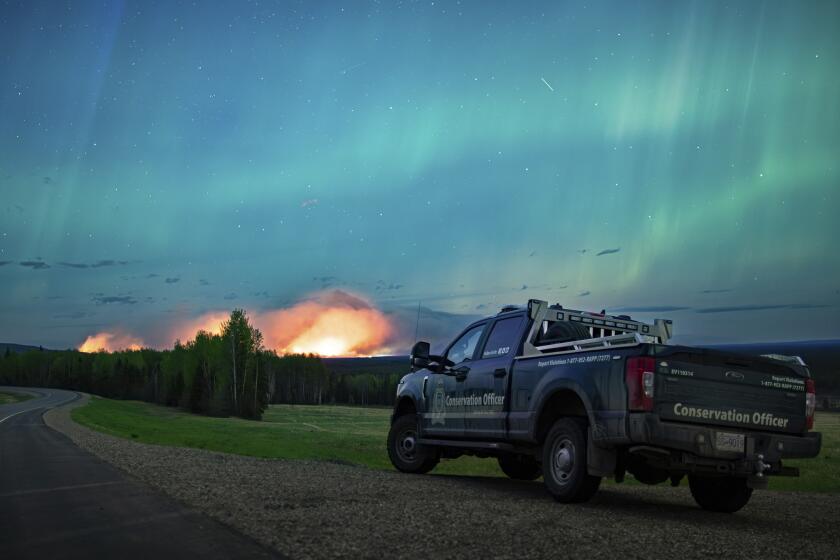Muslim Leaders Confront Bush
In a rare face-to-face meeting with critics, President Bush got an earful Wednesday from Muslim leaders who denounced his policies of occupying Iraq and siding with Israel against the Palestinians.
During a four-hour stop on the Indonesian island of Bali, Bush met with three moderate Muslim leaders who told him politely but bluntly that the United States should set a better example by acting more democratically around the world.
“I told Mr. Bush that if he wants to see a peaceful world, his foreign policy should be changed to be more balanced, more just,” said Syafii Maarif, head of Muhammadiyah, Indonesia’s second-largest Muslim organization, with 30 million members.
In an interview aboard Air Force One afterward, Bush told reporters that he enjoyed the encounter. “They did a lot of talking,” Bush said. “They were, I think, appreciative of the fact that I took time to listen to them and dispel some notions.”
Bush stopped in Bali on his way from Singapore to Australia during a six-nation, seven-day swing through the region. The visit was kept short because of the continuing threat of terrorist attacks in Indonesia. A year ago, 202 people died in the bombing of two Bali nightclubs a few miles from the thatch-roofed hotel where Bush held his meetings.
Bush’s plane landed amid heavy security -- naval destroyers patrolled the coast and frogmen in inflatable boats kept watch along the shoreline. He did not stray far from the landing strip, making a quick motorcade to a hotel adjacent to the airport.
Bush first met and had a working lunch with Indonesian President Megawati Sukarnoputri, who also sat in on the session with five religious leaders -- three Muslims, a Christian and a Hindu priest.
Bush said he listened to the leaders who complained that Muslims were being targeted in the U.S. war on terrorism. At a brief news conference with Megawati afterward, Bush echoed what he told the clerics: U.S. foreign policy targets terrorists, not Muslims.
“Americans hold a deep respect for the Islamic faith, which is professed by a growing number of my own citizens,” Bush said. “We know that Islam is fully compatible with liberty and tolerance and progress because we see the proof in your country and in our own.”
Indonesia, which has the world’s largest Muslim population, is struggling to establish democracy after decades of dictatorship. The country’s first direct presidential election is scheduled next year. Bush noted that the U.S. is supplying funds to help the election process.
Relations between the U.S. and Indonesia have been rocky in the past few years, particularly following the military-sponsored destruction of East Timor in 1999 and suspected military involvement in the killing of two American teachers in 2002. But with the Sept. 11 attacks in the United States and the Bali bombings, the two governments have found common ground in the fight against terrorism.
Bush’s meeting with the religious leaders may turn out to be the most unusual event of his carefully scripted presidential trip. It was supposed to last 30 minutes but ran nearly an hour.
Azyumardi Azra, the rector of National Islamic University in Jakarta, the capital, and one of the participants, said Bush let the clerics speak their minds and jotted down notes of their comments. “I think he was quite open,” Azra said in an interview. “He spoke only a short introduction. Then he let us speak freely, openly and candidly. He was quite willing to listen.” The other participants included Hasyim Muzadi, leader of Nahdlatul Ulama, the country’s largest Muslim group, with 40 million members; Hindu priest Ida Pedanda Made Gede Gunung; and the Rev. Nathan Setiabudi, chairman of the Indonesia Churches Council.
One of the main concerns the Muslim clerics raised with Bush was their perception that the U.S. unfairly favors Israel over the Palestinians. Washington’s policy is breeding resentment against America, they told him, and inspiring many Muslims to become more militant.
“They said the United States policy is tilted toward Israel. And I said, our policy is tilted toward peace,” Bush said on Air Force One. Bush said he is the first U.S. president to advocate the formation of a Palestinian state.
In an effort to improve education and counter the influence of radical thinking in religious schools, Bush pledged $157 million for Indonesian education programs. Muzadi told reporters Bush promised the U.S. would not attempt to use the gift to interfere with school curricula.
Azra said Bush appeared most surprised when the Muslim leaders said the United States should be more democratic.
“In the case of Iraq, the U.S. chose to go to war rather than use peaceful means,” Azra said he told Bush. “He was struck when I said the U.S. had failed to use democracy. I told him we need an example from the U.S., the world’s oldest democracy.”
The clerics also criticized Bush’s use of the term “crusade” after Sept. 11 to describe the war against terrorism. To Muslims, the word evokes the Crusades of the Middle Ages and implies that it is a war against Islam.
Bush told them that he had made a mistake when he used that word and has not used it again, Azra said.
The religious leaders questioned why the United States still occupied Iraq when it had already accomplished its goal of overthrowing Saddam Hussein.
“President Bush answered that the U.S. would be happy to get out of Iraq as soon as possible, but first Iraq needs a constitution,” Azra recounted.
*
Reynolds reported from Bali and Paddock from Jakarta.
More to Read
Start your day right
Sign up for Essential California for news, features and recommendations from the L.A. Times and beyond in your inbox six days a week.
You may occasionally receive promotional content from the Los Angeles Times.






